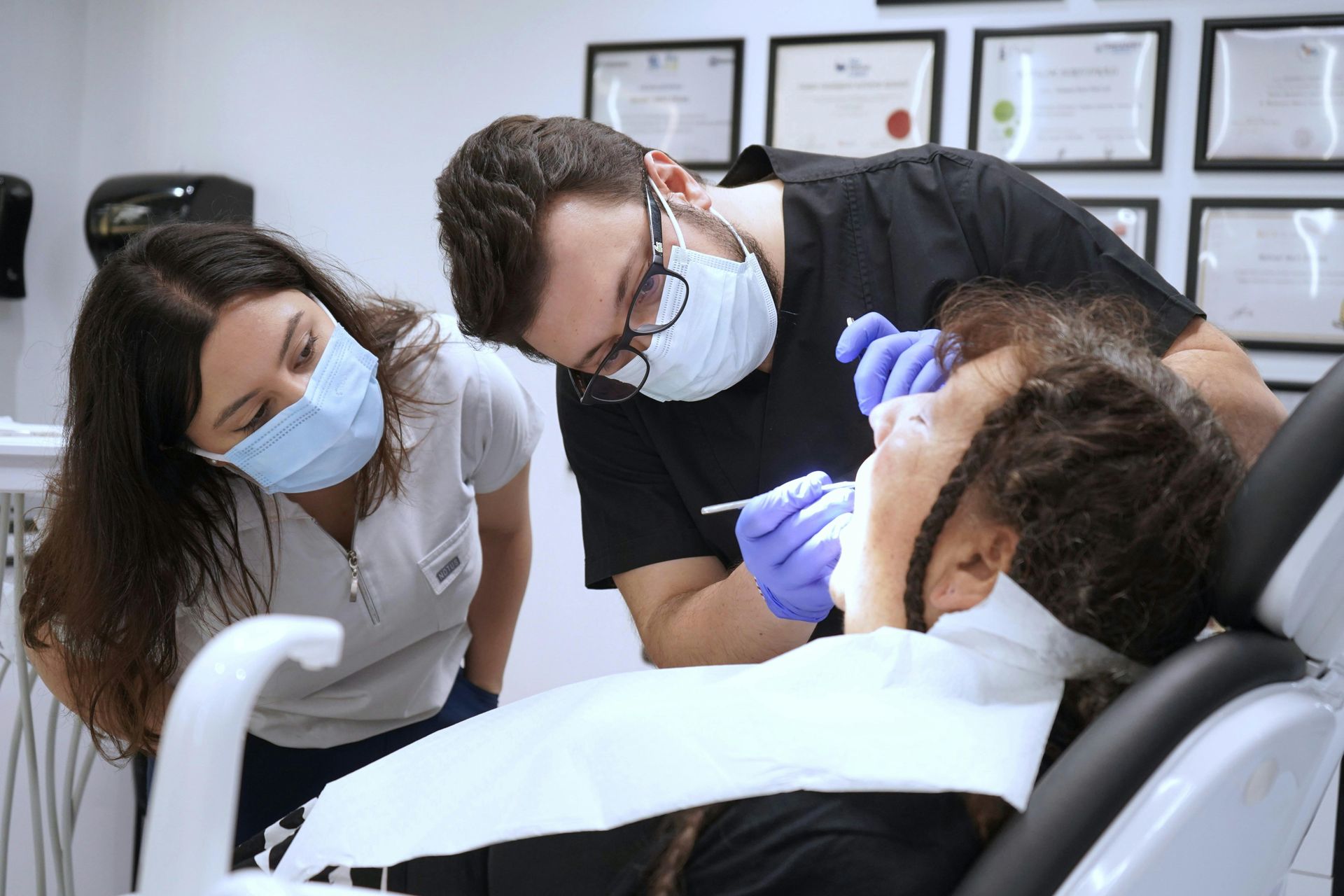Buying a Dental Practice
Buying a dental practice is probably one of the biggest decisions you will ever make in your career. Whether you’re a recent dental school graduate looking to establish your career or a seasoned dentist with dreams of relocating, it’s important to have an experienced dental practice broker by your side as you navigate through the process.
Choosing the Right Dental Practice to Buy
First and foremost, you must understand why you want to buy a dental practice. Owning your own practice comes with a lot of risks but also provides excellent rewards. An informed buyer understands what risks to take and knows specifically what rewards to reap from the business.
Some Common Rewards
- Financial Freedom
- Flexible Schedule
- Sense of Accomplishment
- A Great Lifestyle
Some Common Risks
- Malpractice
- Legal issues with employees
- Bankruptcy
- Burn Out
Once you know why you want to buy a dental practice, explore the available options. Understanding your priorities makes searching for the right practice much easier. To create a specific target practice profile, and so we can ensure a perfect fit, here are some of the most common buying factors:
Area Demographics
Is this practice in an urban, suburban, or rural environment? Location could influence both future revenue streams and access to specific amenities you may require. This is particularly important if you have a specific lifestyle you wish to lead.
Cash Flow
Businesses come in all shapes and sizes. If you have specific ideas about how much gross or net revenue you’d like the practice to be at before you buy, paying attention to current and future revenue streams will influence your purchasing decision.
Dentistry Philosophy
There are many schools of thought and specializations in dentistry. It’s a practical choice to buy a practice that is already operating under the philosophy you subscribe to. This makes change in ownership easier on everyone — including your new patients.
Business Model
There are several business models for dental practices, and they all have their pros and cons. Some practices are Fee for Service only, others mix FFS with PPOs and HMOs, and others rely on Medicaid for new patients and cash flow. It’s important that you understand these various business models and choose wisely.
Transition Process
Determining the change of control, or transition, is critical for a successful dental practice purchase, including for M&A sales. That’s why US Dental Transitions works to ensure there’s a good fit between the selling dentist and the buying dentist. After you purchase the practice, how will you want to assume control? Sometimes, the selling doctor will stay on staff, working for the buying doctor for a period of time. There are other instances where the selling doctor walks away once the transaction is complete.
Price
Price is a major consideration when it comes to how much financing you qualify for. The criteria above will be what drives the decision based on the goals for your practice. Price should be used to screen out dental practices that may have otherwise been a fit if you cannot qualify for the required financing.
We have some excellent dental practices for sale right now. Visit our Dental Practice Listings page. If you do not see a practice that meets your specific needs, contact us and we’ll discuss finding a practice that is right for you.
Buying Dental Practices FAQs
See some common questions and answers below, or call us at 678-482-7305.
-
What factors are most important when buying a dental practice?
The most important factors to consider when buying a dental practice include:
- Office location (rural, suburban, or urban)
- Age and quality of the equipment
- Collections vs. production value
- Overhead costs
- Gross production vs. current or expected production level
- New patient flow and the number of active patients
-
What is a fair cost to buy a dental practice?
Since the value of all dental practices is different, it is difficult to say exactly how much it will cost to buy a dental practice. However, there are several models for calculating the fair market value of a dental practice. Buyers should consult a professional who understands the current dental practice market conditions for assistance with this critical step in the transition process.
-
What are the tax advantages/disadvantages in buying a dental practice?
Upon buying a dental practice you become a business owner, which means your expenses are tax-deductible. Deductions may include pension and saving plans, professional dues, insurance, continuing education fees, car leases, travel expenses, entertainment, meals, supplies, and inventory.
-
When should I make an offer?
Your Practice Broker will provide you with summary information about the practice opportunity you are interested in purchasing. It includes gross sales, lease information, and cash flow. A broker will help you draft an offer based on that information. You are protected by making the offer contingent on your satisfaction with that data upon your full investigation.
A business offer to purchase simply states, “If everything I assume about this practice proves true, this is what I am willing to do.” You, the purchaser, then have the right to proceed, withdraw your offer, or make a new offer based on your investigation. The seller, once he/she has accepted your offer, must stand by those terms unless you, and you alone, choose to alter the terms.
-
How much do Transition Advisors & Dental Practice Brokers charge a purchaser in fees?
US Dental Transitions is different from other brokers in that we do not charge purchasers a dental practice broker fee for practices that we have listed to sell. The seller pays all brokers to sell his/her practice, and the broker represents the seller in the purchase process.
However, some special situations require a buyer to pay a fee. If a buyer wants the broker to search for a practice opportunity, represent them in negotiations and closing, or assist them in the purchase of a specific practice they have located, there may be a small buyer fee.
-
How long should the previous owner work in the office after the dental purchase is complete?
To a large extent, the cash flow of the practice dictates how long the purchaser can afford to employ the previous owner. Our advisors help buyers evaluate whether the practice can afford to employ the previous owner and for how long. According to most studies, approximately 95% of the patient base is transferred to the new owner following a well-planned and executed transition.
-
What can I do to retain current patients after purchasing a dental practice?
There are several steps a buyer can take to ensure maximum patient retention after purchase, including the seller introducing the buyer to staff, staff introducing the buyer to patients, and the buyer sending a letter to all current patients introducing themselves. Although the timeframe for introductions is up to the interested parties, it should be done shortly after the sale.
A qualified Practice Transition Consultant can ensure you take the proper steps for maximum patient retention.
-
What is goodwill?
Every practice has goodwill unless it closes or is failing. The amount to pay for dental practice goodwill depends on the cash flow of the practice, its general attractiveness, transferability, new patient flow, years in practice, office lease and local economic outlook. In short, it’s a complicated process that every seller and buyer should seek help in determining.
-
When should I start looking for a dental practice to purchase?
The answer to this question is based on your understanding of what you want in a practice and when you can start working in it. You need to answer these questions to answer your initial question:
- What type of practice do I want?
- What business model is most desirable?
- Do I want to be in an Urban, Suburban, or Rural location?
- How much can I reasonably finance?
- When can I start working?
-
How long does it take before closing after I find the right practice?
Closing can take from one to three months, depending on the type of financing. Lenders that specialize in dental practice sales often make 100% loans and can complete the closing within a one-month time frame.
Banks and small mortgage companies not familiar with dental practice acquisitions can take three to four months to close the sale. Our Transition Advisors help facilitate this process and maintain relationships with the most common lenders.
-
Why won’t your Transition Advisors show practice financial statements before you are pre-qualified?
Just as you would not want your personal financial documents made available to the public, practice owners only want serious buyers to have access to such private information.
Resource Articles for Buyers
GUIDING YOUR TRANSITION
USDT ROADMAP
TO SUCCESS
After practicing dentistry for 25 years, Dr. Bill Adams founded Southeast Transitions in 1998 to help his fellow dentists transition their practices to other dentists who share similar values and philosophies. The company has grown from Southeast Transitions, a regional company, to US Dental Transitions, a national company.
Buyer Contacts USDT
When the buyer contacts US Dental Transitions to request practice information, the buyer must sign a non-disclosure questionnaire (NDQ). Confidentiality is a key value of US Dental Transitions. The non-disclosure allows the Transition Advisor to understand what the buyer is looking for and includes background information about the buyer to share with the seller. Information may include schools attended, degrees held, any non-compete restrictions, etc.
NDQ for potential Buyer
Before accessing any practice data, all buyers must complete a non-disclosure agreement questionnaire. For larger practices, buyers may need a bank pre-qualification prior to sharing confidential information.
Communicating With the Buyer
After the non-disclosure is returned, our administrative team will connect the buyer with the Transition Advisor. Once the buyer and Advisor speak, the practice information will be shared with the buyer if the wants of the buyer are a good fit.
Bank Pre-Qualification
In order to help expedite the buying process, we recommend that buyers be pre-qualified with a bank before starting the process. Pre-qualification is an informal process to help the buyer determine their spending power. As an example, the buyer may be preapproved for $1.2M, but only looking to buy an $800K practice.
Location Tour & Buyer/Seller Introduction
The buyer will tour the office and discuss practice philosophy with the seller. If the buyer is interested, a Letter of Intent (LOI) is drafted and presented to the seller. The LOI outlines terms such as price, closing date, non-compete clauses, etc. Upon acceptance of the LOI, the buyer’s due diligence period begins. Simultaneously, there is a contract term agreement, formal bank approval, and other steps to close the sale.
Closing & Transitioning
Since every practice transition is different, your Transition Advisor will provide recommendations based on your specific situation. You will be guided through this process with suggestions on how to build relationships with staff and patients, ensuring a smooth transition experience.
Ready to
Get Started?
Contact USDT
Submit your request and we'll get back to you soon.
We will get back to you as soon as possible
Please try again later
CONTACT US
4411 Suwanee Dam Road, Suite 420
Suwanee, GA 30024
USEFUL LINKS
STAY INFORMED
You need a helping hand with your project?
We will get back to you as soon as possible
Please try again later



